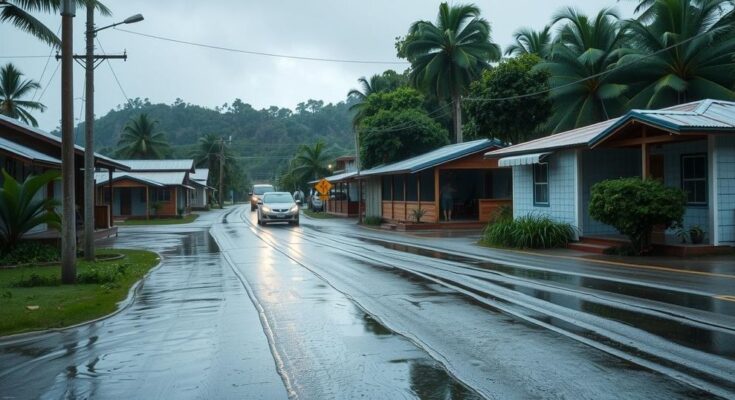Tropical Storm Sara has isolated over 1,700 communities in Honduras due to torrential rain, causing severe flooding and infrastructural damage. With one reported death and over 110,000 affected, the storm has posed significant challenges to disaster response efforts. As it moves toward southern Mexico, officials emphasize the need for ongoing support for impacted residents and highlight climate change’s role in intensifying such events.
In Honduras, Tropical Storm Sara has led to severe disruptions, leaving over 1,700 communities isolated due to extensive flooding. Originating in the Caribbean Sea and impacting the region for four days, the storm has devastated infrastructure, resulting in the destruction of nine bridges and significant damage to additional roads. Although only one fatality has been reported, more than 110,000 residents have been adversely affected, prompting urgent warnings from officials. Forecasts suggest that Sara will weaken further as it progresses into southern Mexico.
The extraordinary rainfall, with reports of up to 500 millimeters in some areas, has caused rivers to overflow, contributing to widespread landslides that have rendered highways impassable. President Xiomara Castro proactively advised individuals living close to rivers to evacuate, resulting in thousands seeking refuge. Assessments indicate that over 2,500 homes suffered damage, with more than 200 completely destroyed during this catastrophic weather event. Tropical Storm Sara marks the 18th named storm of the Atlantic hurricane season and the third to emerge in October alone.
Meteorological experts underscore that the current storms are intensified by elevated sea surface temperatures, a direct consequence of climate change. Kevin Trenberth from the National Center for Atmospheric Research has expressed that while hurricanes are a natural occurrence, anthropogenic climate change exacerbates their severity and increases the potential for significant destruction.
The Atlantic hurricane season typically experiences a series of storms, and Tropical Storm Sara has emerged as a significant event impacting Central America. This year, the season has already seen several storms, with Sara being the latest and particularly destructive due to its slow movement and the resultant heavy rainfall. Flooding caused by tropical storms poses substantial risks to residents in vulnerable regions, often leading to loss of life, property damage, and disruption of essential services. This event highlights the growing concern around climate change and its effect on the frequency and intensity of such natural disasters.
Tropical Storm Sara has severely impacted Honduras, isolating thousands and causing significant infrastructural damage and human dislocation. The inundation of communities reflects the dire consequences that climate-related weather events can impose upon vulnerable areas. As this situation unfolds, the connection between increased storm prevalence and climate change remains a critical discussion point among experts. The Government of Honduras, alongside international organizations, must continue to respond to these challenges to mitigate the impacts of similar future storms.
Original Source: www.bbc.co.uk




